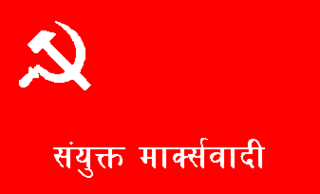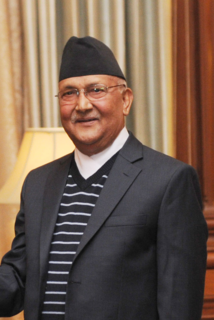The Communist League was a Nepalese communist organization founded in Kathmandu in 1946. It is the source group from which the Nepal Red Communist Party came from.
The Communist League was a Nepalese communist organization founded in Kathmandu in 1946. It is the source group from which the Nepal Red Communist Party came from.

The politics of Nepal functions within the framework of a parliamentary republic with a multi-party system. Executive power is exercised by the Prime Minister and his/her cabinet, while legislative power is vested in the Parliament.

The Nepali Congress is a social-democratic political party in Nepal. Emerging in the 2017 Nepalese general election as the second largest party in the House of Representatives, it is the governing party of Nepal. In Nepal, Nepali Congress remains the largest democratic party of Nepal by number of votes and membership.

The Communist Party of Nepal , abbreviated CPN (Maoist), CPN-Maoist, CPN Maoist, or CPN(M) (Nepali: नेपाल कम्युनिष्ट पार्टी, is a communist political party in Nepal. It was founded in 1994 after breaking away from the Communist Party of Nepal. The party has led three governments, from 2008 to 2009 and from 2016 to 2017 under Pushpa Kamal Dahal and from 2013 to 2015 under Baburam Bhattarai.

The Communist Party of Nepal , abbreviated CPN (UML) (Nepali: नेपाल कम्युनिष्ट पार्टी, is one of the major communist parties in Nepal since its formation in January 1991, merging the Communist Party of Nepal and the Communist Party of Nepal. At today's date, it is the largest opposition party of Nepal.

Sher Bahadur Deuba is a Nepali politician serving as the Prime Minister of Nepal since 13 July 2021. He has previously served four terms as the prime minister and is the Member of Parliament for the parliamentary constituency of Dadeldhura–1. He has been the president of the Nepali Congress since 2016.

The Communist Party of Nepal (Marxist) was a Nepalese political party. It was formed on 1 November 1991 by a group of former leaders of the original Communist Party of Nepal (Marxist) that had been expelled from the Communist Party of Nepal. Initially, it was known as the Communist Party of Nepal but took the name Communist Party of Nepal (Marxist) after approximately one year of existence. Prabhunaryan Chaudhary was the chairman of the party.

Man Mohan Adhikari (Magi) was the 31st Prime Minister of Nepal from 1994 to 1995, representing the Communist Party of Nepal. He was the first communist Prime Minister in Nepal.

The Nepal Workers and Peasants Party (NMKP), also known as the Nepal Majdoor Kisan Party and abbreviated Nemkipa, is a political party in Nepal. The party was founded on 23 January 1975 by Narayan Man Bijukchhe and draws most of its support from Bhaktapur. The party is sympathetic to the Workers' Party of Korea and Juche.

The Communist Party of Nepal (Marxist–Leninist) was a political party in Nepal. It was launched in 1978 by the All Nepal Communist Revolutionary Coordination Committee (Marxist–Leninist), which founded by groups involved in the Jhapa movement. The CPN (ML) published Varg-Sangarsh and Mukti Morcha.

The Communist Party of Nepal (Marxist–Leninist) is a communist political party in Nepal. It was formed by Chandra Prakash Mainali when the Communist Party of Nepal (Marxist–Leninist) reunified with Communist Party of Nepal. Mainali had refused to go along with the merger and led a faction of the former Communist Party of Nepal (Marxist–Leninist) to reorganize the party.

Marxism–Leninism–Maoism–Prachanda Path is the ideological line of the Unified Communist Party of Nepal (Maoist), also known as the UCPN(M). It is considered a development of Marxism–Leninism–Maoism (MLM) and named after the leader of the UCPN(M), Pushpa Kamal Dahal, commonly known as Prachanda. Prachanda Path was proclaimed in 2001. The ideology was partially inspired by the example of the Communist Party of Peru – Shining Path, which refers to its ideological line as Marxism–Leninism–Maoism–Gonzalo Thought.

Madhav Kumar Nepal is a Nepalese politician who served as the Prime Minister of Nepal from 25 May 2009 to 6 February 2011. He previously served as the deputy prime minister, Minister of Foreign Affairs and Minister of Defence in the cabinet of Man Mohan Adhikari. He was previously the General Secretary of Communist Party of Nepal for 15 years.

The Communist Party of Nepal was a political party in Nepal existing from 2005 until 2013.

General elections were held in Nepal on 15 November 1994 to elect the Nepal House of Representatives. The election took place after the previous Nepali Congress government collapsed and King Birenda called new elections. The results saw the Communist Party of Nepal win the most seats in the House of Representatives and Man Mohan Adhikari became Prime Minister at the head of a minority government.

The Nepal Communist Party, abbreviated NCP, was the ruling political party in Nepal, the largest communist party in South Asia, and the third largest communist party in Asia from its foundation in 2018 to its dissolution in 2021. It was founded on 17 May 2018, from the unification of two leftist parties, Communist Party of Nepal and Communist Party of Nepal. The unification was completed by the Party Unification Coordination Committee, after eight months of negotiation. The two predecessor parties subsequently dissolved, making way for the new united party. The party retained the electoral symbol of the CPN, the sun.

Rastriya Janamorcha is a communist political party in Nepal. It was originally founded in 1995 as the legal front of Communist Party of Nepal (Masal). It was refounded again in 2006 after breaking away from Janamorcha Nepal and has acted as the legal front for the Mohan Bikram Singh led Communist Party of Nepal (Masal).

Khadga Prasad Sharma Oli is a Nepalese politician and former Prime Minister of Nepal. He served three terms as prime minister from 11 October 2015 to 3 August 2016, from 15 February 2018 to 13 May 2021 as the first elected prime minister under the new constitution, and from 13 May 2021 to 13 July 2021.

The Communist Party of Nepal is a political party in Nepal founded in April 2013. The party was formed through the merger of Communist Party of Nepal (Unified), Communist Party of Nepal Marxist−Leninist (Samajbadi), Communist Party of Nepal, Marxist Communist Party of Nepal, Bidrohi ML and the Independent Thought Group. Rishi Kattel is the chairman of the party. Jagat Bahadur Bogati and Lok Narayan Subedi serve as co-chairs of the party, whilst Haridev Gyawali, Ram Bahadur Bhandari and Tanka Rai serve as vice-chairs.

Communism in Nepal traces its roots back to the pro-democracy movement of 1951, and the subsequent overthrow of the autocratic Rana regime and the establishment of democracy in Nepal. The communist movement in Nepal has split into factions multiple times and multiple factions have come together into a single fold at times as well. It has a history of getting banned from open political discourse; as well as multiple instances of embracing guerrilla insurgency, most notably, the Maoist insurgency in the 1990s and early 2000s that led to the Nepalese Civil War, claiming at least 17,000 lives. After the Maoists and other main political parties formed a united coalition, launching a successful peaceful civil resistance against the dictatorial coup d'état by the monarchy, which resulted in the abolition of the monarchy and drafting of a new constitution affirming Nepal as a secular, federal, democratic republic striving towards democratic socialism, the two main communist parties of Nepal contested the first election according to the new constitution as a coalition, eventually leading to the unification of two parties with a strong majority in the federal parliament as well as six out of seven provinces of Nepal.